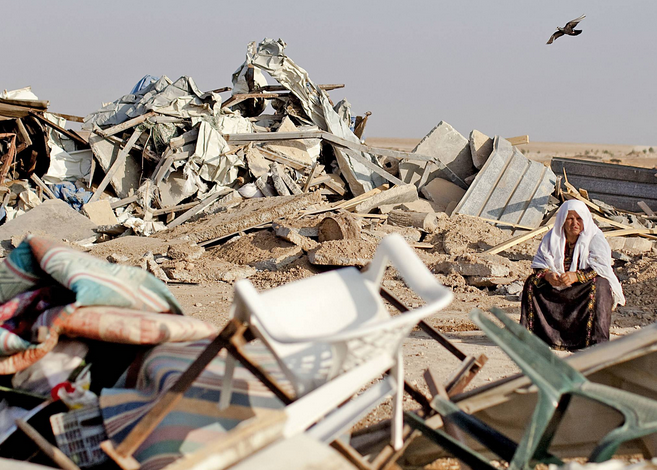The Independent
August 8, 2013

Stun grenades, tear gas, flying rocks and a dispute over land – the scene might be familiar, but the players are less so. Used to running battles with Palestinians over territory, Israel is now facing opposition from another group of people who do not want to leave their homes: the Bedouin.
In northern Israel, a plan to remove tens of thousands of Bedouins from their ancestral villages and resettle them in specially designed towns is meeting resistance. Israel’s Bedouin do not want to move. And that is increasingly becoming a problem, not only for the Bedouin themselves, but also for the Israeli government, which is behind the unpopular plan.
The protests are getting bigger, and they are attracting more attention. Last Thursday, more than 1,000 largely Arab protesters, many of them bused in from towns and cities across the country, held demonstrations against the so-called “Prawer plan”, which, if implemented, will lead to the removal of between 40,000 and 70,000 – depending on who you ask – Bedouin from 35 of their traditional villages.
Wadi Ara, in Israel’s north, is a typical Arab-Israeli town. At least 500 flag-waving Palestinians, the vast majority of them young men and woman, gathered for a protest against the Prawer plan. After speeches in the local park, where the protesters held up signs reading “the new generation will surprise you” and “stop Prawer”, there were the inevitable clashes with security forces – who insisted they would not let the demonstrators reach and block the main road nearby.
Within minutes, onions – used to combat the effects of tear gas – were being thrown at the police, who responded by dragging individual protesters out of the crowd. The onions were soon replaced by glass bottles, rocks and fireworks.
“We have a legal right to be here,” said Eman Hanna, one of the protesters. “We are citizens of this country and have a permit to have the protest, and look, we’re being treated like the enemy. What sort of democracy is this?” Ms Hanna was later pushed back into the main crowd by a female police officer after refusing to step down from a small block to take photographs.
“Did you see that?” asked her friend, Fatima Birro, who had travelled from the coastal town of Jaffa for the demonstration. “Is this law to protest only available for Jews in this country? These people are lawyers and doctors and have a right to be heard. This is not a protest against the Jews, but this is my home too and the Prawer law is denying our right to be in our homes. We are being treated like second-class – no, fifth-class – people in our own land. It’s part of the process of the ethnic cleansings of the Arabs.” Firing stun grenades and tear gas, the police sent the protesters running for cover. After running into a local park, Rana Bishara, another protester wearing a T-shirt denouncing the Prawer law in English, Arabic and Hebrew, spoke of her opposition to the plan.
“They won’t even stop in a children’s park,” she said. “But why are we surprised? The law to remove the Bedouin, who have been there for thousands of years, is all part of the same policy of ethnically cleansing this land of the Arabs. It’s the same with the way the Palestinians are treated in the West Bank behind the Apartheid wall [the security barrier which divides the occupied West Bank and Israel] they built. Where are we supposed to go? They just want us to vanish. They think the new generation will simply forget what has happened, but we won’t.”
This protest, and similar ones in the Negev desert, came less than a week after John Kerry, along with Israeli and Palestinian negotiators, met for the first direct peace talks between the two sides. Although the demonstration was relatively tame and broke up without serious injury, the wider issue of the Bedouin and the Prawer plan is not likely to dissipate quite so quickly. Israel argues that the Prawer plan, which has been approved by ministers but not yet the Knesset, Israel’s parliament, offers the Bedouin the chance to live in recognised villages with modern infrastructure, and represents, the government claims, a compromise over land rights that have been in dispute since Israel was founded in 1948.
The Bedouin see it differently. They say the plan tramples over their rights pertaining to land they have lived on for generations and will lead to the destruction of existing villages, where they wish to stay. Israel considers the villages “unrecognised” and the inhabitants “trespassers on state land”, so it denies, say groups representing the Bedouin, citizens’ access to state infrastructure like water, electricity and sewage.
The Bedouin cause is attracting support not only from Israeli-Arab groups, but also from further afield. Last month, the United Nations’ High Commissioner for Human Rights, Navi Pillay, slammed the Israeli government for its policies towards the Bedouin. “As citizens of Israel, the Arab Bedouins are entitled to the same rights to property, housing and public services as any other group in Israel,” Ms Pillay said. “The government must recognise and respect the specific rights of its Bedouin communities, including recognition of Bedouin land ownership claims.
Read More
